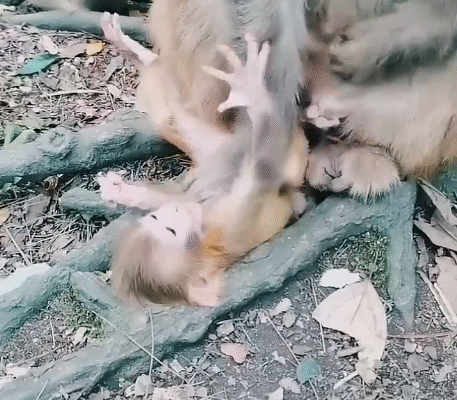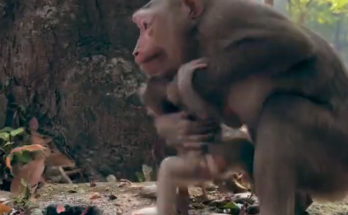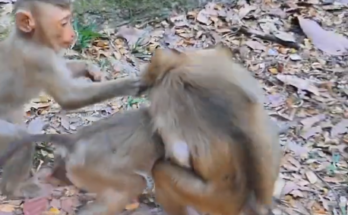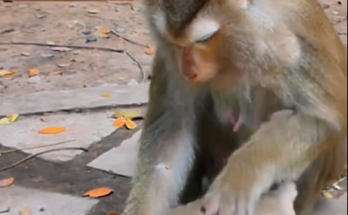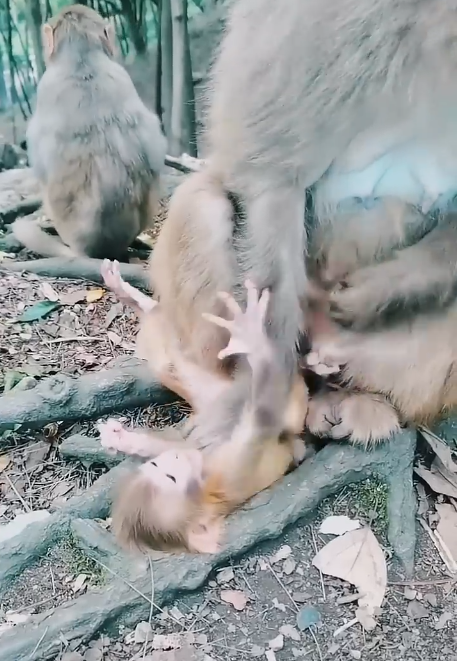
The jungle is a place of life, motion, and delicate balance. Every vine, every branch, every rustling leaf plays a role in a complex symphony of survival. Among its many inhabitants, the monkeys were some of the cleverest, most curious, and most social creatures. But even the cleverest can make mistakes, and sometimes, a single lapse in attention can ripple into chaos.
It all began with Mara, a young mother monkey, new to the responsibilities of parenthood. She had a single infant, a tiny ball of fur with bright, curious eyes and tiny hands that grasped instinctively. The first days had been filled with tentative care—feeding, cleaning, grooming, and holding the little one close—but Mara’s attention soon began to falter. She had grown restless, eager to play with her peers, to swing freely from branch to branch, and to explore the forest without restraint.
It was a morning like any other, with the sun spilling golden light through the canopy, when the consequences of neglect began to unfold. Mara had perched on a high branch, engrossed in a playful chase with a friend, leaving her infant alone on a lower limb. At first, it was a harmless separation—a few minutes of independence. But the jungle does not wait.
The infant, tiny and unsteady, had been left in a precarious position. The branch it clutched was thin, its surface slick from dew, and below lay a tangle of roots and rocks. The baby’s cries, high-pitched and piercing, echoed through the trees, but Mara, absorbed in her games, barely noticed. Her laughter and calls to her friend drowned out the subtle warning signs.
Suddenly, the branch gave way under the infant’s weight. The tiny monkey tumbled, twisting in the air as instinct battled fear. Thankfully, the jungle floor was soft with fallen leaves, but the fall was enough to cause a sharp cry, a mixture of fear and pain, that made even the usually playful animals pause. Birds scattered in alarm. Squirrels froze mid-leap. The forest, for a moment, held its breath.
Mara finally looked down. Panic shot through her chest as she realized what had happened. She leapt down with frantic agility, her heart pounding, only to find her infant shivering and frightened but otherwise unharmed. Relief washed over her, but it was fleeting. This close call had changed something—an invisible boundary between carefree play and the heavy responsibility of motherhood.
From that day forward, Mara’s neglect could no longer be ignored—not by her, and certainly not by the jungle. The infant, having tasted danger so early, clung to every branch, every limb, every familiar face. Mara’s friends, who had often warned her of the consequences of carelessness, now hovered more closely, offering guidance, gentle nudges, and warnings when they noticed her slipping back into distraction.
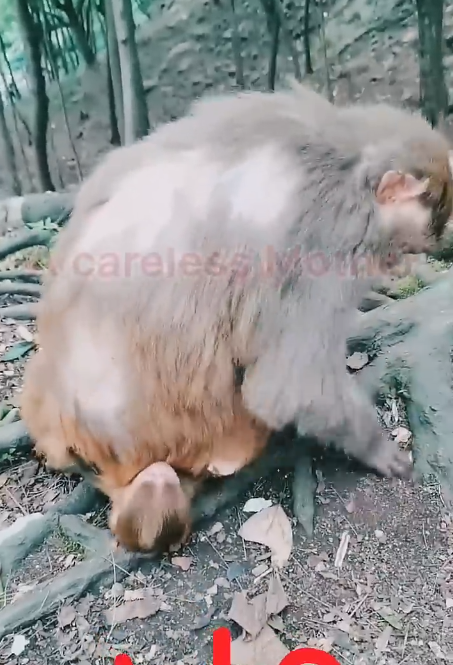
But the lesson was not only for Mara. The infant, resilient yet cautious, began to learn quickly. Each misstep became a teaching moment. If Mara looked away for too long, the baby would refuse to climb or explore. If she tried to play recklessly, the infant would cling tightly, refusing to let go. Slowly, the jungle itself became a classroom, and every branch, vine, and leaf a teacher.
It was on a particularly hot afternoon that the consequences of carelessness became dramatic. Mara, distracted by a troop of playful young monkeys, climbed higher than usual, leaving her infant dangling from a vine near a rocky stream. A sudden slip of footing sent the baby swinging perilously over the rushing water. Heart pounding, Mara scrambled down, yelling and swinging through branches with unmatched speed. Just as the infant’s little fingers began to lose grip, she reached out, catching the baby with a relieved cry.
The incident left Mara trembling, and for the first time, she felt the weight of her carelessness fully. The infant, wide-eyed and clinging, seemed to whisper through its gaze: “Mother, you must protect me.” Mara realized then that neglect, even for a moment, could have far-reaching consequences. She vowed silently to change, to keep her playful instincts in check while still nurturing her young.
Over the following days, Mara’s behavior shifted. She became vigilant, attentive, and more mindful of the dangers around her. She balanced her desire for freedom with the responsibility of motherhood, learning when to play and when to hold tight. The infant, now sensing the change, began to relax, venturing slightly farther under Mara’s careful watch. Trust, once frayed, slowly mended itself.
Interestingly, the jungle responded to this new awareness. Other animals observed Mara’s lessons and adjusted their behavior accordingly. The older monkeys shared tips on safe climbing, the birds warned of approaching predators, and even the leaves and vines seemed more forgiving to the tiny learner. The jungle, which had seemed indifferent, revealed itself to be a supportive network, offering guidance to those willing to pay attention.
Yet the consequences of neglect lingered as a cautionary tale. Mara would occasionally recall the fear in her infant’s cries, the brief flash of danger over the stream, and the knowledge that a single moment of carelessness could have ended tragically. These memories kept her grounded, reminding her that motherhood was both joy and responsibility, both play and vigilance.
The story of Mara and her infant spread through the jungle. Younger monkeys learned from her mistakes. Mothers who had grown complacent shared the tale with others. Even the infant, now slightly older and more confident, would sometimes mimic the careful movements of its mother, a silent testament to the lessons learned from danger.
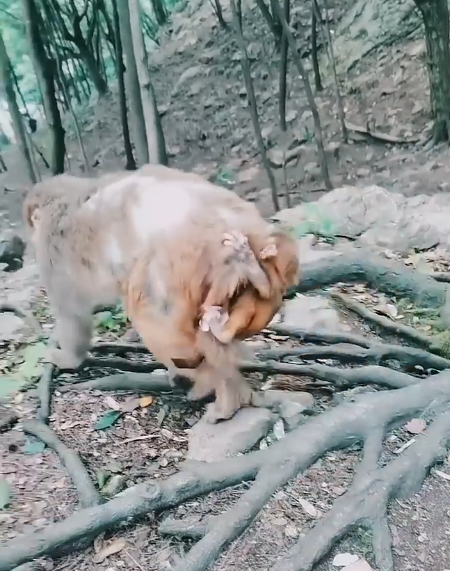
In time, the bond between Mara and her young grew stronger than ever. The fear that had once haunted her infant’s tiny heart transformed into cautious courage, guided by the steady presence of a mother who had learned the hard way the cost of neglect. The jungle, too, seemed to approve, the troop moving together in harmony, aware that vigilance and care were the keys to survival.
Looking back, it was clear: neglect and carelessness in the wild can lead to immediate danger, but the response—learning, vigilance, and nurturing—can turn mistakes into lifelong lessons. Mara’s story became a symbol in the forest, not just of risk, but of redemption. Even when mistakes happen, even when fear takes hold, the capacity for change, for growth, and for attentive care can restore balance.
By the time the sun dipped below the horizon, painting the sky in gold and crimson, Mara sat high in her favorite tree, her infant nestled securely against her chest. The day’s lessons were absorbed in silence, a quiet testament to survival, love, and attention. The jungle continued its song, the birds chirped, and the leaves rustled, but now Mara’s heart beat in rhythm with the knowledge that she would never again take carelessness lightly.
The story of what happens when a neglectful monkey mother is careless is simple yet profound: danger lurks in every moment, consequences arrive swiftly, but with awareness, courage, and love, even the gravest mistakes can transform into life-changing lessons. Mara had learned this firsthand. And as the stars emerged in the darkening sky, the young mother and her infant swung gently on their branch, a picture of trust, vigilance, and the delicate art of raising life in a wild world.
Even in the unpredictable, chaotic jungle, one truth remained: carelessness can cost dearly, but attentive love can save lives—and teach lessons that echo across generations. Mara would never forget. Her infant would never forget. And the jungle itself would whisper the tale to every new mother, reminding all who listened: vigilance, care, and responsibility are the true guardians of life.
